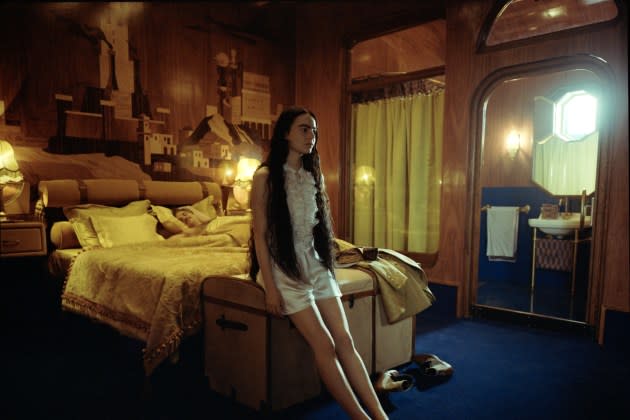‘Poor Things’ Director Talks Emma Stone’s Weird, Wild Sex Scenes

The most talked-about film thus far at the 2023 Venice Film Festival is Poor Things, the third collaboration between director Yorgos Lanthimos and star Emma Stone (The Favourite). A magical mélange of sci-fi, Gothic fiction, Lovecraftian horror, and Frankenstein tale, it follows Bella Baxter (Stone), a young woman with child who flings herself from a bridge. Her barely-living body is recovered by a mad scientist (Willem Dafoe), who experiments on her — keeping her alive by transplanting the brain of her infant child into her, giving Bella the body of a woman and the mind of an infant.
So, Bella stomps around the scientist’s picturesque London mansion, smashing plates, making a “wee” on the floor, and generally raising a ruckus. One day, as Bella is in the throes of discovering her sexuality — by furiously masturbating whenever she can — a caddish, dim-witted lawyer (Mark Ruffalo) steals her away to Lisbon. But he’s in for much more than he bargained for, as Bella is learning day by day that freedom is paramount.
More from Rolling Stone
Wes Anderson Speaks Out Against Roald Dahl Book Censorship in Venice
'Ferrari' Boasts an Oscar-Worthy Penélope Cruz and Some Very Sexy Cars
A Rare, Behind-the-Scenes Look at the Taliban - and Their U.S. Weapons
Lanthimos received the late Alasdair Gray’s blessing to adapt his 1992 novel back in 2011 and began working on the script with screenwriter Tony McNamara while they were making The Favourite. Once they’d wrapped production, Lanthimos brought it to Emma Stone who jumped at the chance to portray this weird, wild woman-child — or as Lanthimos describes it, “This mind that can start free without any shame, prejudice. Just experience the world in her own terms.”
Sex plays a major role in Poor Things, and the education of young Bella, who learns her likes and dislikes through trial and error — first with Ruffalo’s rakish gent, then with a revolving door of men while working as a prostitute in Paris.
“It’s weird, isn’t it? Why is there no sex in movies?” asked Lanthimos during its Venice Film Festival press conference. “It’s a shame that Emma cannot be here with us to speak more about it because it’s weird that it would be coming all from me. First of all, it was an intrinsic part of the novel itself — her freedom about everything, including sexuality. And secondly, it was very important for me to not make a film which was going to be prude because that would be completely betraying the main character.”
He continued: “We had to be confident, and the character had to have no shame, and Emma had to have no shame about her body, nudity, engaging in those scenes. And she understood that right away. The great thing about myself and Emma is that now we’ve completed four films together, so there’s a shorthand. We can communicate without having to explain everything or talk too much about things.”
According to Lanthimos, the Poor Things team employed “practical light” which “enabled us to just have three people in the room” — Stone, cinematographer Robbie Ryan, and himself. They’d “rig mics in various places” so they wouldn’t even need the sound team there, creating an intimate, safe atmosphere for Stone and the other actors. The rehearsal process also helped Stone and Ruffalo become “very familiar” with one another.
“Also, I have to credit Elle McAlpine, who was our intimacy coordinator,” explained Lanthimos. “In the beginning, this profession felt a little threatening to most filmmakers, but I think, like everything, if you work with a good person, it’s great and you realize that you actually need them. She made everything so much easier for everyone. Her personality is great with that kind of thing. She made everyone very comfortable.”
Lanthimos added, “Especially for the sex scenes, we sat down with Emma and decided, ‘What kind of position do we do here?’ ‘What kind of thing there?’ ‘What’s missing?’ ‘What from the experience of sex, and the different desires people have, do we need to portray just to make this enough of a presentation of human desire and its idiosyncrasies.’ It was important for all of us to have that be a part of the film and not shy away from it. And it’s also very fun sometimes.”
Best of Rolling Stone

